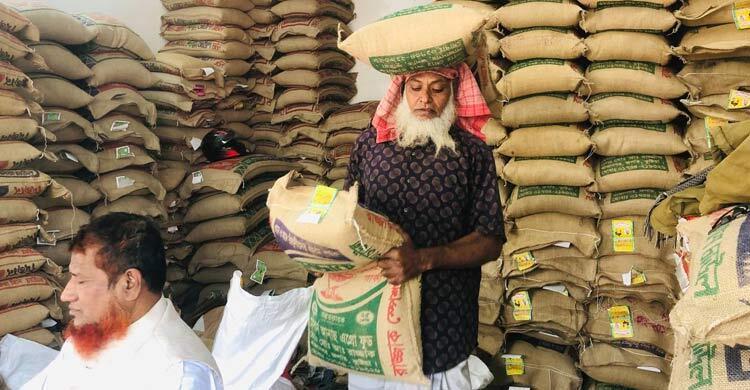Tags
Rice prices soar again, who will rein in?
Al Mamun Sagar

The price of rice continues to rise, leaving consumers grappling with increasing costs and frustration.
Over the past week, prices in Kushtia’s Khajanagar, the country’s second-largest rice hub, have surged by Tk 2–3 per kg at the mill gate and by Tk 4 per kg in retail markets.
With Kushtia’s market trends influencing the entire country, the spike is being felt nationwide.
The price hike is being attributed to syndicates and unchecked market manipulation. Buyers, especially in low- and middle-income groups, are voicing their anger, warning that if the trend continues, rice could soon reach Tk 100 per kilogram.
A snapshot of rising prices
On Monday (December 16), a survey of Kushtia’s markets revealed that:
Miniket rice, a popular choice, now costs Tk 74 per kg, up from Tk 70.
Basmati rice has increased to Tk 92 per kg from Tk 88.
Kajalalata rice now costs Tk 70 per kg, up from Tk 66.
BRRI 28, popularly known as Athash, rice rose to Tk 58 per kg from Tk 54.
Swarna rice is being sold at Tk 54 per kg, compared to Tk 50 last week.
Mill owners in Khajanagar have reportedly adjusted their prices twice in the past week, citing increased costs for raw rice.
Khajanagar in Kushtia is renowned nationwide as a hub for processing Miniket rice. The area houses 64 auto rice mills, which produce and distribute hundreds of truckloads of Miniket rice daily to Dhaka and other parts of the country. According to mill owners, the price of Miniket rice stood at Tk 67 per kg before the political transition on August 5. By October 10, the price had slightly dipped to Tk 66.5 per kg, leading to a surge in demand.
Behind the price hike
Joynal Abedin Pradhan, General Secretary of the Bangladesh Auto Major and Husking Mill Owners Association, explained that rising demand, coupled with seasonal shortages, has driven up prices.
A 50-kg sack of miniket rice, which cost Tk 3,400 two weeks ago, now costs Tk 3,700. He urged the government to import rice and enforce strict monitoring of millers and wholesalers.
Rice mill owner Jihaduzzaman Jiku attributed the surge to rising input costs, with raw rice prices increasing by Tk 300 per maund in just one week.
Consumer and farmer perspectives
Schoolteacher Rabiul Islam, shopping in Kushtia’s municipal market, expressed outrage at the unchecked price hikes, accusing a strong syndicate of traders and the government’s inaction.
Meanwhile, traders anonymously claimed that 10–12 influential rice dealers in Khajanagar, allegedly linked to Awami League Joint General Secretary Mahbub ul Alam Hanif, have long controlled the market. They speculated that these traders might be exploiting the current political climate to destabilise the interim government.
Farmers in Kushtia also face challenges. Senior agricultural marketing officer Sujat Hossain Khan reported lower-than-expected rice yields this year, further tightening supply.
Government response
Kushtia Deputy Commissioner Taufiqur Rahman acknowledged the issue, saying that an investigation has been launched. Law enforcement agencies and market monitoring teams are assessing allegations of hoarding and market manipulation. “If discrepancies are found, swift action will be taken,” he assured.
A looming crisis
The rising prices are putting additional pressure on households already burdened by inflation. Without timely intervention, the soaring cost of rice could deepen socioeconomic inequality, leaving the nation’s poorest struggling to afford a basic staple. As the situation unfolds, all eyes remain on the government’s ability to curb the price surge and ensure fair market practices.
https://www.jagonews24.com/en/business/news/79120Published Date: December 17, 2024






